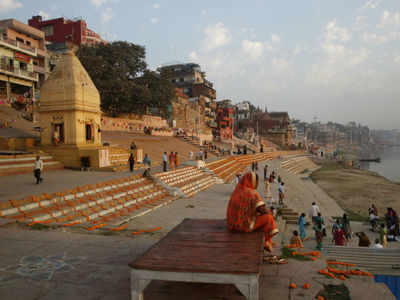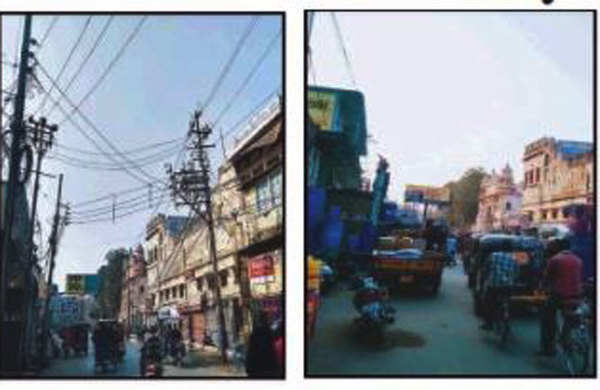- News
- India News
- World’s oldest city goes ‘wireless’
Trending
This story is from March 25, 2018
World’s oldest city goes ‘wireless’
Laying cables for 50,000 consumers through the serpentine lanes and congested markets in one of the world’s oldest cities was quite a challenge for Powergrid, the company conducting the integrated power development scheme (IPDS) project.

File photo
Key Highlights
- Former Union minister of state for power and coal Piyush Goyal announced the Rs 432-crore project for underground cabling work under IPDS for Varanasi in June 2015.
- Work started in December 2015, and Goyal visited regularly to monitor the project and said it would be completed in a year though it had a two-year deadline.
VARANASI: Eighty-six years after the city got electricity, overhead power cables in Varanasi are being dismantled after a project to lay underground lines over 16 sq-km has been finally completed. Laying cables for 50,000 consumers through the serpentine lanes and congested markets in one of the world’s oldest cities was quite a challenge for Powergrid, the company conducting the integrated power development scheme (IPDS) project.
“Demographics-wise Seoul and some Turkish cities on the riverfront were considered complicated. While implementing IPDS in Varanasi, we realised this is the most complicated city to lay infrastructure for underground cables,” said Powergrid’s project manager for IPDS Varanasi, Sudhakar Gupta. The company took two years, and finished in December 2017.
Former Union minister of state for power and coal Piyush Goyal announced the Rs 432-crore project for underground cabling work under IPDS for Varanasi in June 2015. Prime Minister Narendra Modi launched the Rs 45,000-crore IPDS for the country in Varanasi in September 2015. The pilot project was rolled out in Kabir Nagar and Ansarabad.

Before and after: The same locality in Varanasi, earlier criss-crossed with wires (left) until the Powergrid project dismantled the power cables and laid underground lines (right)
Work started in December 2015, and Goyal visited regularly to monitor the project and said it would be completed in a year though it had a two-year deadline. “Major differences were found in the actual requirement and proposal in the detailed project report,” a Powergrid official said. Since lanes are narrow, very small pedestal boxes had to be installed for switch boxes.
Eleven old substations have been modernised and two new ones built at Chowk and Kazzakpura areas. Dealing with existing underground utility lines for sewage, water supply, BSNL, among others, was also a challenge. As there is no map of these lines, Powergrid workers often damaged them, stopping work till compensation was paid to the agency concerned. Atul Nigam, managing director of Purvanchal Vidyut Vitran Nigam Limited, said line and revenue losses have reduced after putting cables underground. Line loss in the area covered by IPDS has come down to 9.9% from 42.7%, while consumer complaints have dropped as well, he said.
“Demographics-wise Seoul and some Turkish cities on the riverfront were considered complicated. While implementing IPDS in Varanasi, we realised this is the most complicated city to lay infrastructure for underground cables,” said Powergrid’s project manager for IPDS Varanasi, Sudhakar Gupta. The company took two years, and finished in December 2017.
Former Union minister of state for power and coal Piyush Goyal announced the Rs 432-crore project for underground cabling work under IPDS for Varanasi in June 2015. Prime Minister Narendra Modi launched the Rs 45,000-crore IPDS for the country in Varanasi in September 2015. The pilot project was rolled out in Kabir Nagar and Ansarabad.

Before and after: The same locality in Varanasi, earlier criss-crossed with wires (left) until the Powergrid project dismantled the power cables and laid underground lines (right)
Work started in December 2015, and Goyal visited regularly to monitor the project and said it would be completed in a year though it had a two-year deadline. “Major differences were found in the actual requirement and proposal in the detailed project report,” a Powergrid official said. Since lanes are narrow, very small pedestal boxes had to be installed for switch boxes.
Eleven old substations have been modernised and two new ones built at Chowk and Kazzakpura areas. Dealing with existing underground utility lines for sewage, water supply, BSNL, among others, was also a challenge. As there is no map of these lines, Powergrid workers often damaged them, stopping work till compensation was paid to the agency concerned. Atul Nigam, managing director of Purvanchal Vidyut Vitran Nigam Limited, said line and revenue losses have reduced after putting cables underground. Line loss in the area covered by IPDS has come down to 9.9% from 42.7%, while consumer complaints have dropped as well, he said.
End of Article
FOLLOW US ON SOCIAL MEDIA










